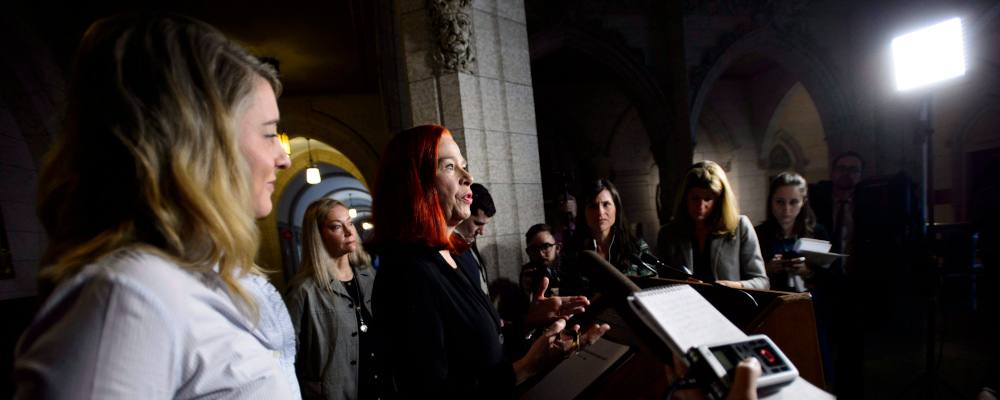If you want to turn a room of stodgy Conservatives into a revivalist mosh pit, all you have to do these days is shout “Defund the CBC!”
And all God’s people will yell back: “Amen, brother.”
The flock was rocking again this month when CBC President Catherine Tait crossed a line and named her chief political nemesis by name.
“There’s a lot of CBC bashing going on—somewhat stoked by the Leader of the Opposition,” Tait told the Globe & Mail. “I think they feel the CBC is a mouthpiece for the Liberal government.”
They sure do. Conservative Party and Opposition Leader Pierre Poilievre took one look at that fat pitch and swung for the fences, tweeting that “she launched a partisan attack against me, proving my claim that the $1.2-billion corporation is a mouthpiece for Justin Trudeau.”
Which in turn prompted a Twitter defence from former CBC journos.
Terry Milewski, retired for seven years, a fine journalist and no friend of Jean Chretien’s, made a good case. Jody Vance, now appearing on CHEK, was 100 percent behind CBC’s virtue.
“I did sports in the (CBC) Vancouver newsroom,” she Tweeted. “I can tell you, with absolute certainty, there is zero bias. Journalists are in constant pursuit of the truth ….”
No doubt proving everyone’s points, she then went on to describe how Poilievre’s attacks were undermining freedom of the press and, shortly after, retweeted a few posts regarding the evils of Jordan Peterson.
I don’t know what Tait was thinking, or if she was thinking at all. A couple of weeks previously she was insisting that declining faith in CBC journalism was due to social media. All CBC can do, she said, is continue doing what it is doing. In other words, keep on digging.
That determination to dig—that unsupported conviction that it is always us and never them that is at fault—is turning the “defund the CBC” battle cry from mere red meat for the Conservative base into an increasingly mainstream view. In other words, stripping the CBC of public funds could actually happen.
Tait could have said: “We are always looking to improve; better is always possible.”
She could have acknowledged that nonpartisan media bias trackers consistently place CBC to the Left, and even argued that’s where most Canadians are at.

But she didn’t. At a time when all media need to restore public trust, she just dug. And dug.
CBC may operate the nation’s most visited news website and its local morning radio shows are market leaders, but its TV audience has disappeared and ratings for its news are in the low single figures.
In the past, most Canadians seemed, despite their viewing patterns, to still like the idea of the CBC. Those sympathies are gone.
The news division’s hesitation to initially report on the Chinese influence revelations and then, when doing so, drawing criticism for its pro-government approach, has further fuelled detractors.
Today, according to the Angus Reid Institute’s polling, 64 percent of Canadians are OK with defunding the sometimes public, sometimes commercial organization. That includes 84 percent of Conservatives, 71 percent of “others,” 50 percent of Bloc-istes, 37 percent of Greens, and even 34 percent of Liberals and 31 percent of New Democrats.
So while I told The Hub’s Stuart Thomson a few weeks ago that the public would be inclined to rally around the CBC should it become an election topic, I’m not so sure that stands up anymore. So I shall stop digging.
That doesn’t mean it would be wise to amputate $1.2 billion from the CBC and leave it to wriggle around trying to figure out how to get by on its remaining $650 million—$250 million of which is advertising.
Key issues still need to be thought through. Among them are:
- If broadcast TV in French is to be cut, will Noovo provide sufficient competition to balance separatist Pierre Karl Peladeau’s TVA?
- What happens in the North? Right now, CBC North is the only service dedicated to serving residents of Canada’s territories with the information they need to organize their lives. Were Prime Minister Poilievre to defund, he would need to give the CBC some direction on this. This could possibly interact with a revived policy interest in the North. Under the current regime, after all, there has been no interest in connecting it, developing it, or, really, even defending it.
- Will radio remain advertising-free? Stripped of public funding but left with the power to sell advertising, the CBC would likely move swiftly to sell radio ads. Given the extreme circumstances, the Liberal-appointed Canadian Radio-television and Telecommunications Commission (CRTC) could comply and help a Poilievre-gutted CBC find new revenue—perhaps as is done in Britain for the BBC via a license fee paid by consumers. This could cause unnecessary controversy among commercial radio broadcasters and, in the case of a hefty license fee, consumers stuck with “refunding the CBC.”
In other words, if the Conservatives really do plan to “defund the CBC,” they would be wise to decide if they want to kill it completely or let it live. And, if the latter, in what form? Because at the end of the day, this debate won’t die until something different is tried.
Recommended for You

Laura David: Red pill, blue pill: Google has made its opening salvo in the AI-news war. What’s Canadian media’s next move?

The Notebook by Theo Argitis: Mark Carney’s first major tests

The Weekly Wrap: Trudeau left Canada in terrible fiscal shape—and now Carney’s on clean-up duty

Ben Woodfinden: Lament for an ‘elbows up’ nation




